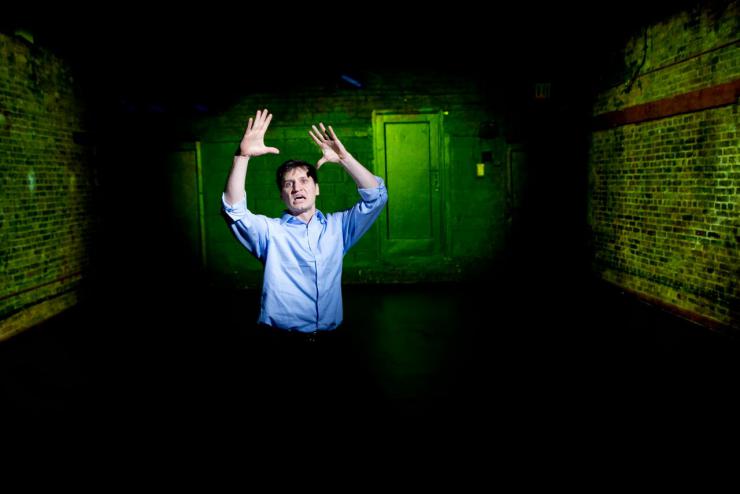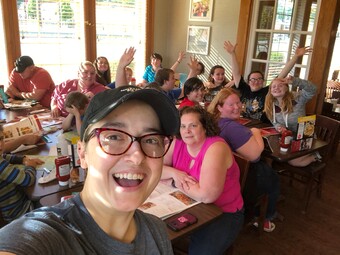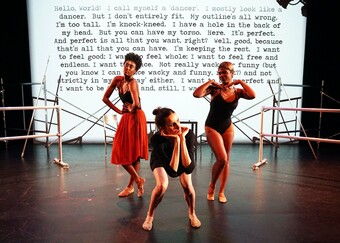All Eyes on Me (whether I like it or not)
Tourette Syndrome in the Theatre
At this point, most of us have heard plenty about the event at a recent performance of the Broadway production of The King and I, in which an audience member began making loud noises, which prompted those around him to rally against the boy’s mother and yell for him to be removed. The actor onstage, Kelvin Moon Loh, who posted the much-viewed Facebook post describing the event, determined that the boy had Autism and denounced the audience’s close-minded behavior. It was exciting to witness his defense of the mother and son and the ensuing support as his message went viral.
While going to the theatre has always been a great joy and a big part of my life, it has pretty much always been associated with a great deal of stress and anticipation of how much unwanted attention I'll receive.
I've had many awkward experiences at the theatre, both as an audience member and actor, due to my Tourette Syndrome and its symptoms, most often manifesting in a loud cough or throat clearing. While going to the theatre has always been a great joy and a big part of my life, it has pretty much always been associated with a great deal of stress and anticipation of how much unwanted attention I'll receive.
Sometimes I negotiate between how much I want to—or need to, professionally speaking—attend a certain show, and how much I anticipate disrupting said show. It's a tough negotiation, as I love the theatre and want to stay up-to-date on what’s happening, but I’m aware that if I get a reputation in the industry as an actor who cannot keep a lid on his noisy outbursts, it could negatively affect my career. Thankfully, when I’m acting at least, my tics magically disappear.
That said, I still worry every time I go to see a play. While I have yet to provoke such monumental rage in so many people as this poor kid has, I've certainly been encouraged by many fellow audience members to exit the theatre. I've also been the subject of many angry accusations from all manner of people in restaurants, stores, and, (the worst) on the subway. While I generally understand where they're coming from, I've often been surprised by how quickly people can decide exactly what's wrong with me without bothering to ask before lashing out. For as long as I can remember, I’ve seen and heard some vicious things from complete strangers.
I’ve had people tell me to stay at home if I’m sick, regardless of how much I tell them that I’m not. I’ve had people yell at me at the top of their lungs, disbelieving that I have any sort of neurological condition. I’ve watched as groups of people of any age laugh hysterically and imitate whatever it is I’m doing.
It’s difficult to deal with, obviously, and it can also produce self-consciousness and anxiety, wondering whether I should actually take the public’s advice and avoid public places, cruel as it may be. When my tics are especially severe and I am drawing the attention of an entire subway car or bus, it’s hard to maintain self-confidence and remember that I am not at fault. As the audience in question made clear, people do not want to be disturbed by the actions of others. Being noticeably different can make life pretty confusing.
Mob mentality is always disappointing, and I hate to say that I'm not surprised that, as Loh writes, "the audience started to rally against the mother and her child to be removed.” I am intimate with the quick ability of a group to come to a conclusion—or even diagnosis—and to act against a perfect stranger. In fact, bearing the brunt of so much unsolicited analysis has actually given me a unique understanding of human behavior and helped me as an actor.

I’m very lucky that I’ve gotten the support I have throughout my life and that I have tapped into the benefits of having Tourette (lots of people with Tourette Syndrome note a higher level of specific creative abilities). It’s helped me go to work on my solo show, The Elephant in Every Room I Enter, which had its World Premiere in October 2015 at La Mama, in New York City. In it, I detail my life with Tourette and the week I spent last spring at the Tourette Association of America National Conference. It was there that I met hundreds of people with Tourette from all over the country, encountered tics I’d never seen before (people bear hugging strangers, unable to let go, to mention one), and shared stories of ostracism and adversity. It was the first time in my life I ever felt normal.
I’m grateful that my show has been receiving such support and praise. My collaborator and the show’s co-creator, Kel Haney, and I, along with a number of talented designers, have put together a wildly original show that, in my opinion, puts the experience of having such a strange neurological disorder on the stage.
One thing that struck me about the conference was how each generation in attendance had had a different experience with Tourette, due to the slowly increasing awareness of the public. While the oldest attendees had had very little support (many had never even been diagnosed until very recently), the youngest were enjoying the benefits of decades of advocacy and were on their way to an easier life.
While the event at The King And I is upsetting, it intrigues me that Loh’s defense of the mother and son drew such enormous reaction and conversation. Perhaps we are in the midst of a new movement in theatre. I certainly hope so.










Comments
The article is just the start of the conversation—we want to know what you think about this subject, too! HowlRound is a space for knowledge-sharing, and we welcome spirited, thoughtful, and on-topic dialogue. Find our full comments policy here